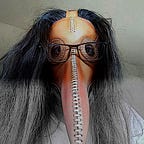The Evil We Know
Extracted from Kodumaro.
One can pass through life unaware of the evil, but not untouched by it.
Evil is what happens when the shadow, choked by the superego’s tyranny, finds a way out to be.
Why is evil so bound to religion and morality? ’Cause it’s their side effect.
The religion and morality are the remaining of the society proto-norms, born from the prestige bias in many ways. So the evil is.
The prestige bias creates a distorted right-vs-wrong principle, nondetachably bound to the first impressions (principia). It gives birth to an indissuadable collective superego, ready to kill in its beliefs’ sake.
So, in self-defence the superego is capable of everything, fighting back ideas or even facts that might put it in check.
That’s the chance the shadow was waiting for in order to get abroad. Now, like a flogged wild beast, it jumps over the target, driven by the fury of all the pique it has fed against the superego, controlled by the very same superego, that focuses it against the potential menace.
This that I just described as “evil” is a constituent part of the human being.
And the religion? The morality?
This “evil” is the religion/morality’s core engine: the morality (and the religion as morality’s fenomena) is the proto-norms’ consolidation, accusing the “other” — them — of evil, heading the rage-blind shadow demon hound, which is the very evil, to the other.
The only way to defeat the evil is by killing the collective superego, creating an individual one, companion of the shadow, in peace with it.
Et ses mains ourdiraient les entrailles du prêtre,
Au défaut d’un cordon pour étrangler les rois.
(Diderot)
This is a fierce quote, but if nonetheless taken symbolically, there’s no other way to set human free.
